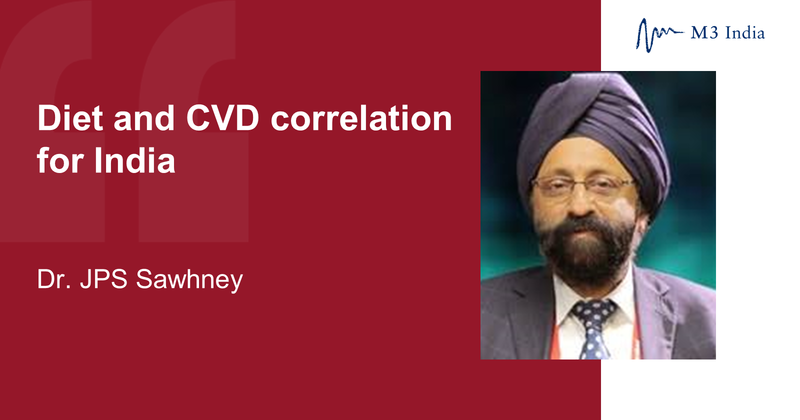Diet rich in potassium Vs Reduced sodium diet : Dr. JPS Sawhney comments
M3 India Newsdesk Sep 29, 2018
Dr. JPS Sawhney, a clinical and preventive cardiology expert discusses a recent study that links diet and cardiovascular diseases and what it means for Asians.

Unhealthy diet is one of the modifiable risk factors for the causation of cardiovascular diseases. At present low-fat diet with saturated fatty acids to less than 10% of energy intake is considered healthy. These recommendations are based on European and American studies. Extrapolating these results to developing nations is not justifiable where undernutrition is still a concern.
In a very recent The Prospective Urban Rural Epidemiology (PURE) study dietary intake was recorded for 1,35,335 individuals of 35-70 years across 18 countries. The purpose of this study was to assess the association between carbohydrates, fats and cardiovascular disease. Repeated measures of selected risk factors, cause of death, and other detailed data, health outcomes related data were collected during follow-up which occurred at 3, 6, and 9 years.
Dr. JPS Sawhney
"The study confirmed the heart-healthy benefits of consuming fruits and vegetables rich in potassium. It was also shown that 3-4 servings per day were beneficial enough as compared to the current recommendation of 5 servings per day.
Finally, for primary and secondary prevention of cardiovascular diseases, one should consume fresh fruits and vegetables, whole grains, legumes and nuts. Sugar, salt and refined foods should be limited or avoided. Trans fats should be avoided. To prevent cardiovascular disease and mortality other lifestyle factors like physical activity, avoidance of tobacco, stress control and control of obesity are needed in addition to the healthy diet."
PURE study
In this study, standardised questionnaires were used to record detailed information about demographic factors and lifestyle including, education, income, employment, smoking, physical activity, and alcohol intake, health history, and medication use.
International Physical Activity Questionnaire and Food Frequency questionnaires were filled at baseline. Keeping in mind the region-specific variations in food in India, region-specific questionnaires were validated for food intake.
The epidemiological cohort prospective study, concluded that higher total fat or individual types of fat are associated with lower risk of total mortality, non-cardiovascular disease mortality, and stroke whereas high carbohydrate intake was associated with higher risk of total mortality. One of the interesting facts which came into light is inverse association of monosaturated fatty acids and total mortality.
Contrary to the past findings, these findings could be due to the fact that more than 50% of the study population was from low- and middle-income countries where people consumed a low fat; high carbohydrate diet i.e 60-70% of their energy was derived from carbohydrates. Since high carbohydrate diets are also associated with high triglycerides, low HDL and increased small dense LDL can increase atherosclerosis, therefore it is suggested that low carbohydrate diet should be recommended in such countries.
In this study authors also studied the association of sodium and potassium intake with cardiovascular disease and mortality.
It was concluded that sodium intake higher than 5g/day is associated with increased risks for stroke or cardiovascular disease.
Andrew Mente is the lead author of the paper "Urinary sodium excretion, blood pressure, cardiovascular disease, and mortality: a community-level prospective epidemiological cohort study" published in The Lancet. According to him, “A number of studies have found a U-shaped relationship between sodium and cardiovascular events, with a 'sweet spot' in the middle — between 3 and 5 g per day — associated with the lowest risk.” That means salt consumption either less or more both are risky. It was also mentioned that any health risk associated with sodium intake is eliminated if people consume adequate quantity of fruits, vegetables, dairy foods, potatoes, and other potassium-rich foods.
For each 1 g increase in estimated sodium intake, systolic BP increased by a 2.86 mmHg (95% CI 2·12–3·60, p<0·0001). The World Health Organization currently recommends a target of 2 g/day sodium (equivalent to approximately 5 g/day salt). But this recommendation is based on the association between sodium intake and blood pressure. It is assumed that the effect of sodium intake on cardiovascular disease is mediated through its effects on blood pressure.
In the PURE study authors have shown that the associations between sodium intake and cardiovascular events did not change after adjusting for age, sex, and BP. This suggests that the effects of sodium intake on cardiovascular events are not related to the effects of sodium intake on BP.
Rather, with increasing potassium intake in all communities, there was a decrease in cardiovascular outcomes. That indicates that a diet rich in potassium will have greater benefit as compared to sodium reduction.
In part 2, Dr. V Mohan, a renowned Diabetologist discusses his finding as lead investigator, India, of the PURE study. Read What the PURE study finding of dairy & CVD correlation mean for India: Dr. V Mohan
Disclaimer- The views and opinions expressed in this article are those of the author's and do not necessarily reflect the official policy or position of M3 India.
-
Exclusive Write-ups & Webinars by KOLs
-
Daily Quiz by specialty
-
Paid Market Research Surveys
-
Case discussions, News & Journals' summaries